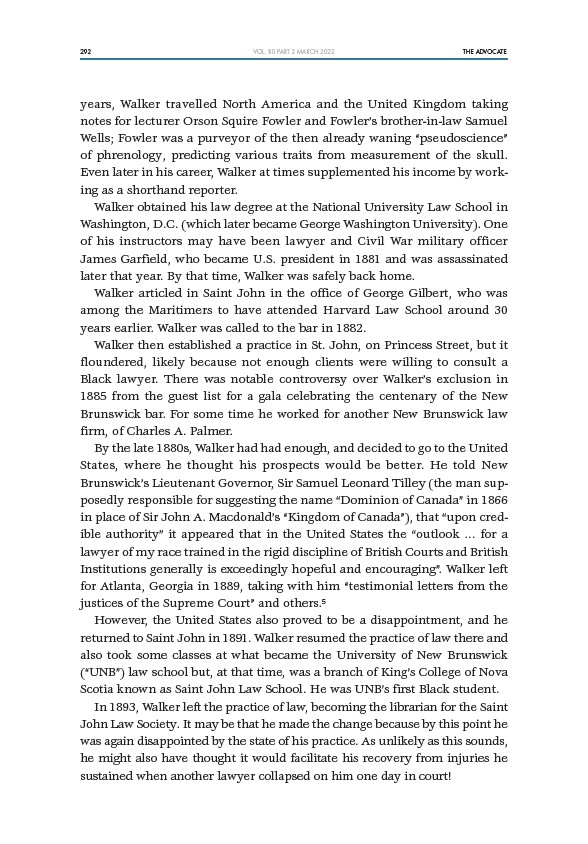
292 THE ADVOCATE
VOL. 80 PART 2 MARCH 2022
years, Walker travelled North America and the United Kingdom taking
notes for lecturer Orson Squire Fowler and Fowler’s brother-in-law Samuel
Wells; Fowler was a purveyor of the then already waning “pseudoscience”
of phrenology, predicting various traits from measurement of the skull.
Even later in his career, Walker at times supplemented his income by working
as a shorthand reporter.
Walker obtained his law degree at the National University Law School in
Washington, D.C. (which later became George Washington University). One
of his instructors may have been lawyer and Civil War military officer
James Garfield, who became U.S. president in 1881 and was assassinated
later that year. By that time, Walker was safely back home.
Walker articled in Saint John in the office of George Gilbert, who was
among the Maritimers to have attended Harvard Law School around 30
years earlier. Walker was called to the bar in 1882.
Walker then established a practice in St. John, on Princess Street, but it
floundered, likely because not enough clients were willing to consult a
Black lawyer. There was notable controversy over Walker’s exclusion in
1885 from the guest list for a gala celebrating the centenary of the New
Brunswick bar. For some time he worked for another New Brunswick law
firm, of Charles A. Palmer.
By the late 1880s, Walker had had enough, and decided to go to the United
States, where he thought his prospects would be better. He told New
Brunswick’s Lieutenant Governor, Sir Samuel Leonard Tilley (the man supposedly
responsible for suggesting the name “Dominion of Canada” in 1866
in place of Sir John A. Macdonald’s “Kingdom of Canada”), that “upon credible
authority” it appeared that in the United States the “outlook … for a
lawyer of my race trained in the rigid discipline of British Courts and British
Institutions generally is exceedingly hopeful and encouraging”. Walker left
for Atlanta, Georgia in 1889, taking with him “testimonial letters from the
justices of the Supreme Court” and others.5
However, the United States also proved to be a disappointment, and he
returned to Saint John in 1891. Walker resumed the practice of law there and
also took some classes at what became the University of New Brunswick
(“UNB”) law school but, at that time, was a branch of King’s College of Nova
Scotia known as Saint John Law School. He was UNB’s first Black student.
In 1893, Walker left the practice of law, becoming the librarian for the Saint
John Law Society. It may be that he made the change because by this point he
was again disappointed by the state of his practice. As unlikely as this sounds,
he might also have thought it would facilitate his recovery from injuries he
sustained when another lawyer collapsed on him one day in court!